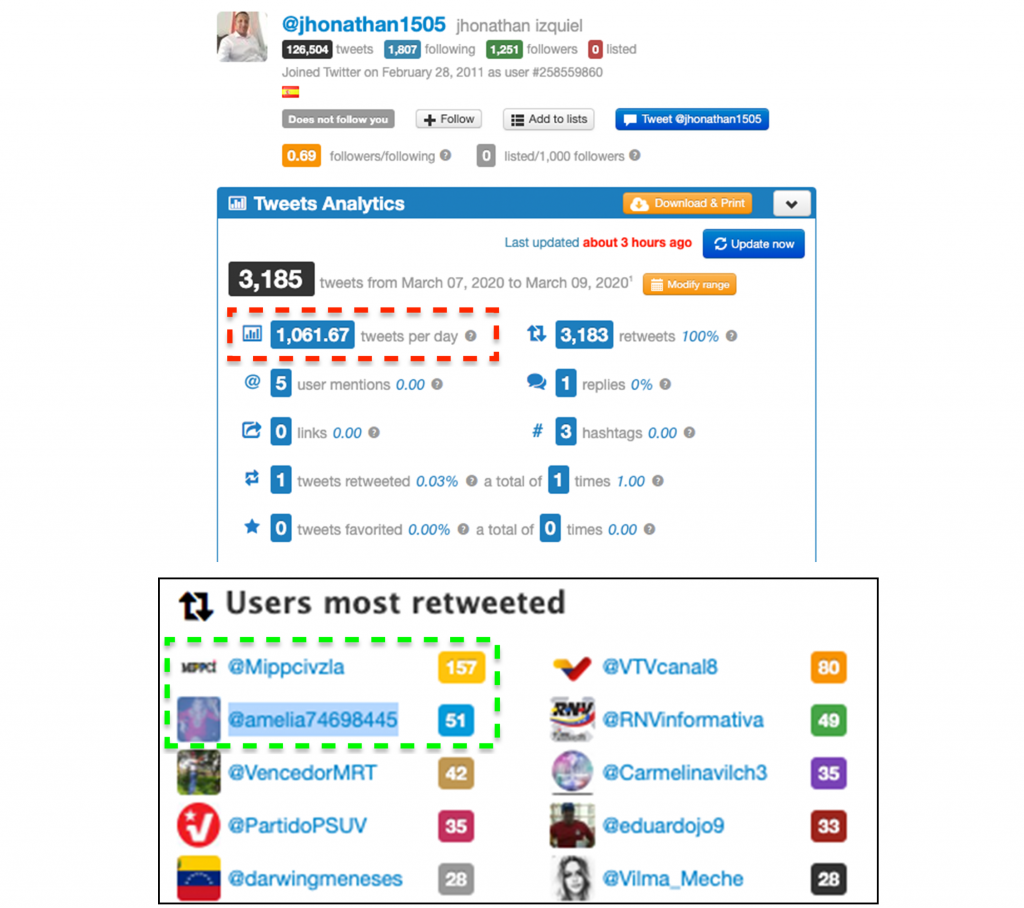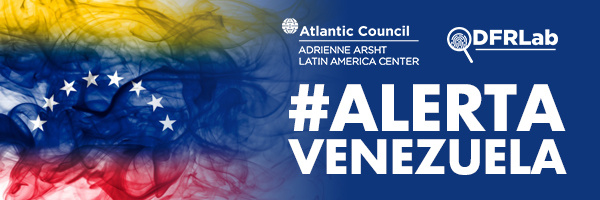#AlertaVenezuela is leading the way in identifying, exposing, and explaining disinformation within the context of one of the Western Hemisphere’s largest crises in recent history, where the fight for control of the information space will continue to pose a challenge for the region.
Top Story
Maduro regime pushed Twitter hashtag against U.S. sanctions
Nicolás Maduro and his Vice President Delcy Rodríguez promoted the hashtag #LasSancionesSonUnCrimen (“Sanctions are a crime”) on March 6, 2020, when it also reached the trending topics of the country on Twitter. The hashtag was part of a broader campaign launched by the regime that same day to protest U.S. sanctions imposed on Venezuela.
On February 13, 2020, the Venezuelan Chancellery presented a referral against U.S. sanctions to the International Criminal Court (ICC). Maduro claimed the sanctions were an “obsessive and criminal abuse of the U.S. government against the Venezuelan people.” The United States, which is an unratified signatory of the ICC and therefore not bound by its rulings, did not comment on Venezuela’s request. On March 6, during a press conference to launch the campaign, Rodríguez said that the ICC had started reviewing the referral. This has not been confirmed by the ICC, which usually does not rule on inter-state disputes. The first tweets using #LasSancionesSonUnCrimen appeared while the vice president was speaking on television.
Maduro used the hashtag to accuse the White House of “having a terrorist plan [the sanctions] to destabilize Venezuela.” He also promoted a booklet that, according to him, explains the “consequences of the imperial aggressions against Venezuela.” The booklet claims that sanctions resulted in a lack of access to food, medicine, and other basic goods, causing “immense damage to the Venezuelan people.”

The hashtag trended between March 6 and March 8 and was used on 108,412 tweets by 9,899 accounts. One of the first accounts promoting the hashtag was the regime’s Ministry of Communications, which later deleted the tweet. The Ministry’s account promoted #LasSancionesSonUnCrimen as the “hashtag of the day” and asked followers to share it. This account promotes hashtags every day to reach the country’s trending topics, and there is an indication that some accounts receive money to amplify these hashtags.

The DFRLab found signs of traffic manipulation in the amplification of the hashtag. According to a DFRLab query using Brandwatch, 93 percent of mentions (101,204 uses) of the hashtag were retweets, and 7 percent (7,208 tweets) were original posts or replies. On average, each account tweeted the hashtag 11 times – this number has historically been below two in organic campaigns previously analyzed by the DFRLab. Moreover, 78 percent of all mentions to the hashtag came from the most active 10 percent (990) of accounts, which suggested that a small group of accounts was tweeting the hashtag repeatedly to make it trend.
The most active account, for instance, tweeted the hashtag 640 times in three days. @jhonathan1505 displays unusual behavior. Between March 7 and March 9, for example, the account averaged 1,061 tweets per day, according to a search using Twitonomy, equating to an average 42 times per hour over a single 24-hour period. All of its posts were retweets, with an especially high volume of retweets of Maduro’s Ministry of Communications, suggesting it was acting in particular to amplify the regime’s communications. @jhonathan1505 also interacted with @amelia74698445, an account that often appears among the most active accounts promoting pro-Maduro hashtags.

Talk of the Country
In the Media
On March 7, Bloomberg published an article about U.S. President Donald Trump’s meeting with Brazilian President Jair Bolsonaro in Florida that day. Bloomberg said the two leaders discussed their efforts “to oust” Maduro. It cited “a senior Trump administration official” who told reporters that “the U.S. wants the Maduro regime smashed and destroyed if free elections cannot be achieved in Venezuela.” The publication also quoted the official statement after the meeting in which the two presidents reiterated their joint support for democracy in the region, “including Interim President of Venezuela Juan Guaidó and the democratically elected Venezuelan National Assembly as they work to restore constitutional order in Venezuela.”
On March 5, Venezuelan media outlet MultimedioVTV, better known as Venezolana de Television, broadcast a statement in which Jorge Rodríguez (brother to Delcy Rodríguez), Maduro’s minister of communication, claimed that he had evidence that Guaidó staged an attack against him on February 29, 2020, when Guaidó and his supporters were attacked by armed men during a rally. According to Jorge Rodríguez, security forces captured the masked man who pointed a gun at Guaidó. The broadcast included a video in which the alleged suspect confessed that he was hired to threaten Guaidó. The minister claimed the man was part of a plan that wanted to portray Guaidó as a victim of the Maduro regime. Jorge Rodríguez then asked international press agencies, especially The Associated Press, to correct the articles they had published about the incident, suggesting he was worried about the international audience. After the incident, Guaidó’s team shared images of alleged suspects with the media, claiming they were Maduro supporters. Jorge Rodríguez did not mention any of these people in his statement.
What’s Trending
On Social Media

The hashtag #TodoPorVzla (“All for Venezuela”) trended on Twitter between March 3‑4, 2020. Guaidó’s team and supporters used the hashtag ahead of the rally he called for on March 10.
Official Statements
“A parir, pues, a parir! Todas las mujeres a tener seis hijos, todas. Que crezca la patria.”
“Give birth, let’s do it, give birth! All women should birth six children, all of them. Let the fatherland grow.” – Nicolás Maduro on Twitter on March 3. On that day, Maduro was evaluating his plan “Humanized Childbirth.” He added that “women are made to give birth.”
We hold Maduro and those around him responsible for the safety and welfare of #Venezuela’s Interim President @JGuaido. @UNHumanRights has called for dissolution of regime-backed gangs, like colectivos, because Venezuelans need security, not regime-promoted violence and predation.” – Mike Pompeo, U.S. secretary of state, on Twitter on March 3.
Recent Analyses
From the DFRLab: On Friday, March 6, the DFRLab published “Rumors of a U.S. military intervention in Venezuela grow.” The article built on an earlier newsletter that examined rumors claiming that a U.S. military intervention would happen in Venezuela after Guaidó’s international tour through Europe and the Americas. The claim amassed substantial engagement through websites and YouTube channels.
From the Adrienne Arsht Latin America Center: Jason Marczak, director of the Adrienne Arsht Latin America Center, and Camila Hernandez, assistant director for Colombia, wrote for The Hill on the need for continued U.S. assistance to Colombia as it works to support Venezuelan migrants escaping the country’s crisis.
Angela Chavez, assistant director with Adrienne Arsht Latin America Center and Venezuela expert, in a New Atlanticist piece, discussed the dire circumstances facing Venezuelan women as they flee from the political, economic, and humanitarian crisis.
Subscribe to the #AlertaVenezuela newsletter
To receive future editions of the #AlertaVenezuela newsletter each week, sign up below!
